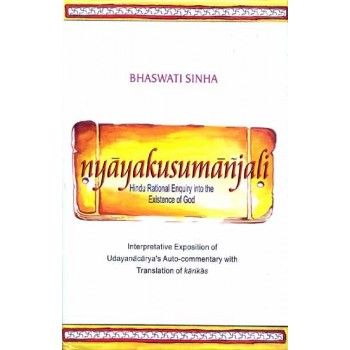Nyaya Kusumanjali Hindu Rational Enquiry into the Existence of God
| Price: | Rs.700.00 |
Detail Of Nyaya Kusumanjali Hindu Rational Enquiry into the Existence of God
| ISBN | 8173051518 |
| Pages | 357 |
| Language: | English |
| Product Code: | 1 |
| Size(in cm): | 8.7" X 5.7" cm |
| Weight(in grams): | 590(approx) |
Description:
Contents
Preface
STABAKA - 1
God - The Controller of Adrsta
Invocatory verse 2; Considering the existence of Supreme Being 4; Logical enquiry into the existence of God as reflection 6; Fivefold objection against the existence of God 7; Existence of super-natural cause on account of dependence 12; Refutation of the theory of accidental and spontaneous origination 14; Stream of cause and effect beginningless 21; Diversity and refutation of unitary cause 28; Universal observance establishing the causality of adrsta 31; Souls' experience of the fruits of action through adrsta 34; Like existence non-existence, a cause as well as an effect 35; Meaning of counteraction and contracting agent 38; Theory of sakti refuted 39; Purificatory modification produced in the person through spraying, sprinklin, etc. 42; Production non-production of touch in air and obstruction of fluidity in water, presence of deities in images 45; Auxiliary of the cause of victory of defeat 46; Refutation of Sankhya for agency and sentience criticized 51; Refutation of doctrine of momentariness 55; Determining endurableness 65; Carvaka refutation of causality rebutted 66; Invariable antecedence as causality 67; Causality of eternal and all-pervading soul determined 68; Concluding verse 70.
STABAKA - II
God - The Author of the Vedas
Mimamsa view of apauruseyatva of the Vedas refuted 71; Extrinsic validity of knowledge upheld 76; Intrinsic validity of knowledge refuted 77; Eternality of the Vedas not accepted 79; Creation and dissolution established 99; Authority of the Vedas by Kapila and other refuted 113; Omniscient God, the author of the Vedas 115; Concluding verse115.
STABAKA-III
No Proof for Non-existence of God
Non-cognition, not a proof for non-existence of God 117; Mimamsa doctrine of all-pervasiveness of mind refuted 121; Inference, not a proof for no-existence of God 131; Carvaka view of non-congnition proving non-existence of God refuted 137; Definition of aprayojaka-hetu 139; Analogy, not a proof for non-existence of God148; Prabhakara view of analogy refuted 148; Nyaya view of analogy stated 151; Vaisesika view of analogy refuted 152; Verbal testimony, not a proof for non-existence of God 158; Vaisesika view of verbal testimony refuted 158; Prabhakara theory of anvitabhidhanavada refuted 166; Bhatta theory of anvitabhidhanavada analysed 174; Verbal testimony proving existence of God established 176; Presumption, not a proof for non-existence of God 177; Presumption, a form of inference and not a distinct means of knowledge 179; Non-cognition include in perception and inference and not a distinct means of knowledge 183; Concluding verse 201.
STABAKA-IV
God - The Substratum of Valid knowledge
Mimamsa theory of valid knowledge refuted and Nyaya theory stated 202; validity of memory rejected 207; Doctrine of cognizedness refuted 213; Super-sensuousness of knowledge rejected 217; God as the substratum of valid knowledge established 233; Concluding verse 236.
STABAKA - V
Proofs for the Existence of God
Inferential proof for the existence of God 237; First ground of inference, effecthood; explained 239; Second ground of inference, concertive activity; explained 266; Third ground of inference, 'support' and destruction; explained 271; Fourth ground of inference, empirical usage; explained 274; Fifth and Sixth grounds of inference 'authoritativeness' and 'sruti', explained 276-77; Seventh ground of inference, 'sentences', explained 278; Eighth ground of inference, 'particular number', explained 283; Second interpretation of the first ground of inference 287; Second interpretation of the second and the third grounds of inference 293; Second interpretation of the fourth ground of inference 294; Second interpretation of the fifth ground of inference 297; Meaning of Vidhi-Pratyaya (injunction) discussed 298; Vidhi, not an attribute of Karta 299; Vidhi, not an attribute of Karma or Kriya 312; Vidhi, not an attribute of Karana 322; Second interpretation of the sixth ground of inference 335; Second interpretation of the seventh and the eighth ground of inference 336-37; Direct perception of God possible 339; Concluding verse 342-43.
Reviews (0)
There are no reviews for this product.
Write a review
Your Name:Your Review:
Note: HTML is not translated!
Rating: Bad Good
Enter the code in the box below:



 |
| 